When you say “as soon as possible,” you’re expressing urgency, importance, and care—but sometimes, that phrase can sound too formal or even rushed. Finding other ways to say “as soon as possible” can help you express the same meaning with warmth, clarity, and thoughtfulness.
Whether you’re writing to a colleague, emailing a client, or messaging a loved one, choosing the right alternative makes your words sound more human and considerate. These 20 thoughtful alternatives will help you communicate with kindness and clarity, making every message feel personal and respectful.
What Does “As Soon As Possible” Mean?
The phrase “as soon as possible” means to do something quickly and without unnecessary delay. It often implies a sense of urgency, but it can also communicate importance and priority.
In everyday communication, people use this phrase when they want something done promptly, but the exact timing depends on context and urgency. It’s used both professionally and casually, though sometimes it may sound a bit demanding or impersonal—that’s why choosing softer, warmer alternatives can make your tone feel more genuine.
Is It Professional or Polite to Say “As Soon As Possible”?
Yes, it is professional to say “as soon as possible”, but it can sound too direct or hurried in certain situations. In professional settings, using alternatives such as “at your earliest convenience” or “when you get a moment” can make your message sound more polite and understanding.
When you communicate with empathy and warmth, people are more likely to respond positively. The key is to match your tone to your relationship and the situation.
List of Synonyms for “As Soon As Possible”
- At your earliest convenience
- When you get a chance
- At your convenience
- As soon as you can
- When possible
- At your earliest opportunity
- At your leisure
- Whenever you have a moment
- At the soonest possible time
- Without delay
- As soon as it’s convenient
- Promptly
- At your soonest convenience
- As quickly as you’re able
- As promptly as possible
- At the earliest possible moment
- When you can
- When you’re free
- When time allows
- When you have a chance to breathe
1. At Your Earliest Convenience
Meaning: This phrase means you’d like someone to take action when they have the first reasonable opportunity. It shows respect for their time while still expressing gentle urgency.
Scenario: Perfect for professional emails where you want to sound polite yet firm, like requesting a document or response.
Examples:
- Please send me the updated report at your earliest convenience.
- Could you review the draft at your earliest convenience?
- Let me know your thoughts at your earliest convenience.
- I’d appreciate your feedback at your earliest convenience.
- Kindly confirm the schedule at your earliest convenience.
Tone: Professional, respectful, and courteous.
Explanation: Using “at your earliest convenience” makes your message sound considerate and patient, showing that you value the other person’s time and priorities. It’s often used in business or formal writing to keep communication polite and positive.
2. When You Get a Chance
Meaning: This expression means whenever you have some free time to handle it, without sounding pushy or demanding.
Scenario: Useful in friendly or semi-professional contexts, especially when the matter isn’t too urgent.
Examples:
- Could you look over this document when you get a chance?
- Let’s catch up about the project when you get a chance.
- Please send me the update when you get a chance.
- I’d love your opinion when you get a chance.
- Can you sign this form when you get a chance?
Tone: Warm, casual, and kind.
Explanation: The phrase “when you get a chance” softens the urgency while keeping the request clear. It’s a friendly and understanding way to ask for help or action, perfect for maintaining good relationships at work or in personal communication.
3. At Your Convenience
Meaning: It means you can do it whenever it suits you best—it’s polite, respectful, and allows flexibility.
Scenario: Often used in emails, letters, or messages where you want to give someone the freedom to choose their timing.
Examples:
- Let’s schedule a call at your convenience.
- You may return the signed form at your convenience.
- Please contact me at your convenience.
- Feel free to respond at your convenience.
- We can meet at your convenience to discuss further.
Tone: Polite, patient, and professional.
Explanation: Saying “at your convenience” shows grace and patience, allowing the other person to decide when to respond. It’s a gentle alternative that’s suitable for both formal and semi-formal communication, helping you sound thoughtful and composed.
4. As Soon As You Can
Meaning: This phrase means you’d like someone to do something quickly, but without the strictness of “ASAP.”
Scenario: Good for friendly reminders or urgent but polite requests where you want to keep the tone considerate.
Examples:
- Please reply as soon as you can.
- Could you send me the file as soon as you can?
- Let’s finish this task as soon as you can.
- Please review the details as soon as you can.
- I’d appreciate it if you could confirm as soon as you can.
Tone: Caring, respectful, and slightly urgent.
Explanation: Using “as soon as you can” balances urgency with empathy, showing that while the task is important, you understand the other person may have other priorities. It’s softer than “ASAP” but still conveys the need for prompt action.
5. When Possible
Meaning: This phrase means to do something whenever it’s feasible or convenient, giving room for flexibility.
Scenario: Useful in situations where you don’t want to rush someone, such as coordinating with colleagues or asking for favors.
Examples:
- Please share the photos when possible.
- Let me know your availability when possible.
- Send me the invoice when possible.
- Can you update me when possible?
- Please review the form when possible.
Tone: Polite, patient, and understanding.
Explanation: By saying “when possible,” you express kindness and awareness that the other person might be busy. It’s ideal for keeping your communication gentle and pressure-free, especially in collaborative environments.
6. At Your Earliest Opportunity
Meaning: This phrase means you would appreciate the task being done at the first available moment, while still being polite and respectful of the person’s time.
Scenario: Ideal for formal communication, especially in business or customer service when you need a response soon but want to stay courteous.
Examples:
- Please get back to me at your earliest opportunity.
- I’d appreciate receiving the details at your earliest opportunity.
- Let’s discuss this further at your earliest opportunity.
- Could you share your thoughts at your earliest opportunity?
- Kindly process the request at your earliest opportunity.
Tone: Formal, professional, and considerate.
Explanation: The phrase “at your earliest opportunity” communicates polite urgency, giving importance to the matter while still allowing flexibility. It’s a gentle and respectful alternative often used in emails, letters, and official requests.
7. At Your Leisure
Meaning: This means whenever you have free time to do it, without any rush or pressure.
Scenario: Best for casual or friendly contexts, or when the task is not urgent at all.
Examples:
- Please read the article at your leisure.
- You can send the feedback at your leisure.
- Feel free to explore the document at your leisure.
- Let’s connect about it at your leisure.
- Take a look at the photos at your leisure.
Tone: Relaxed, friendly, and calm.
Explanation: Using “at your leisure” creates a stress-free and kind tone, showing that you value comfort and choice over speed. It’s perfect for maintaining warm, understanding communication.
8. Whenever You Have a Moment
Meaning: It means when you find a small window of time to handle it, in a soft and friendly way.
Scenario: Commonly used in friendly work environments or with close colleagues where you want to be polite but still get things done.
Examples:
- Could you sign this form whenever you have a moment?
- Please share your thoughts whenever you have a moment.
- Let’s review the changes whenever you have a moment.
- I’d love your feedback whenever you have a moment.
- Could you check your inbox whenever you have a moment?
Tone: Gentle, friendly, and patient.
Explanation: This phrase helps you sound kind and approachable, especially in team communication. It avoids sounding pushy and shows that you respect the other person’s time and pace.
9. At the Soonest Possible Time
Meaning: This phrase means as early as someone can reasonably manage, while keeping the tone slightly more formal than “ASAP.”
Scenario: Commonly used in business or professional writing, especially when you want to show urgency in a respectful way.
Examples:
- Please complete the form at the soonest possible time.
- I’d appreciate an update at the soonest possible time.
- Kindly process the payment at the soonest possible time.
- Let’s arrange a meeting at the soonest possible time.
- Could you confirm this at the soonest possible time?
Tone: Formal, respectful, and slightly urgent.
Explanation: Using “at the soonest possible time” expresses importance and timeliness but avoids sounding abrupt. It’s perfect when you need quick action without losing politeness.
10. Without Delay
Meaning: This means to act immediately or very quickly, emphasizing speed and urgency.
Scenario: Used in professional or critical situations where something needs attention right away.
Examples:
- Please address this issue without delay.
- Kindly send the confirmation without delay.
- Let’s finalize the order without delay.
- The report should be completed without delay.
- Please notify me without delay.
Tone: Firm, professional, and urgent.
Explanation: The phrase “without delay” is strong and clear, suitable for formal instructions or urgent communication. It conveys the need for immediate action without being rude or harsh.
11. As Soon As It’s Convenient
Meaning: This phrase combines urgency with empathy, asking for promptness while showing respect for the person’s schedule.
Scenario: Perfect for emails or messages where you want to sound professional yet understanding.
Examples:
- Please reply as soon as it’s convenient.
- Can you send the files as soon as it’s convenient?
- I’d appreciate your response as soon as it’s convenient.
- Kindly let me know your decision as soon as it’s convenient.
- We can talk more as soon as it’s convenient.
Tone: Polite, empathetic, and balanced.
Explanation: Using “as soon as it’s convenient” keeps your request gentle and flexible, showing care and respect for the other person’s comfort and timing. It’s a soft, human-centered alternative to “ASAP.”
12. Promptly
Meaning: “Promptly” means to do something quickly, efficiently, and without unnecessary delay.
Scenario: Ideal for professional writing or when you need to emphasize timeliness and reliability.
Examples:
- Please reply promptly to confirm.
- We will address the issue promptly.
- Kindly send your approval promptly.
- The payment should be processed promptly.
- I’d appreciate a response promptly.
Tone: Formal, efficient, and direct.
Explanation: The word “promptly” adds a sense of professional urgency, showing you value both time and efficiency. It’s commonly used in business or service-related communication.
13. At Your Soonest Convenience
Meaning: A mix of urgency and courtesy—it means you’d like something done soon, but still on their own timeline.
Scenario: Useful in business or polite requests that need timely attention without sounding strict.
Examples:
- Please get back to me at your soonest convenience.
- Could you share your thoughts at your soonest convenience?
- Kindly review the proposal at your soonest convenience.
- Let’s finalize this at your soonest convenience.
- Please send the documents at your soonest convenience.
Tone: Polite, formal, and gently urgent.
Explanation: This phrase adds a touch of elegance and respect, giving a feeling of importance and flexibility at the same time. It’s perfect for maintaining professional courtesy.
14. As Quickly As You’re Able
Meaning: It means you’d appreciate a fast response or action, while recognizing the person’s capabilities and workload.
Scenario: Best for friendly professional exchanges or situations where you want quick action with empathy.
Examples:
- Please send the update as quickly as you’re able.
- Could you confirm as quickly as you’re able?
- I’d appreciate your feedback as quickly as you’re able.
- Kindly finalize this as quickly as you’re able.
- Please review the document as quickly as you’re able.
Tone: Kind, considerate, and slightly urgent.
Explanation: This phrase balances speed with humanity, making your message feel warm yet efficient. It’s a wonderful way to ask for urgency without sounding commanding.
15. As Promptly As Possible
Meaning: This means you’d like something to be done quickly, with an emphasis on timeliness and professionalism.
Scenario: Great for official requests or customer support communication.
Examples:
- Please process the payment as promptly as possible.
- We’ll address the issue as promptly as possible.
- Kindly send the confirmation as promptly as possible.
- Let’s complete the task as promptly as possible.
- Respond as promptly as possible, please.
Tone: Professional, formal, and efficient.
Explanation: The phrase “as promptly as possible” sounds polished and businesslike. It communicates a clear sense of urgency while maintaining respectful professionalism.
16. At the Earliest Possible Moment
Meaning: This means as soon as someone has the very first opportunity to act or respond.
Scenario: Often used in formal letters or requests where timing is important but tone must remain polite.
Examples:
- Please respond at the earliest possible moment.
- Kindly update me at the earliest possible moment.
- Let’s schedule the meeting at the earliest possible moment.
- Send your feedback at the earliest possible moment.
- Confirm the details at the earliest possible moment.
Tone: Formal, polite, and slightly urgent.
Explanation: Using “at the earliest possible moment” reflects a sense of timeliness and respect. It’s perfect for official requests where you value both speed and courtesy.
17. When You Can
Meaning: A soft, empathetic way to say “whenever you’re able to do it”, showing flexibility and understanding.
Scenario: Ideal for friends, teammates, or colleagues, especially when you don’t want to pressure them.
Examples:
- Please call me when you can.
- Send the file when you can.
- Let’s catch up when you can.
- Could you review this when you can?
- Please reply when you can.
Tone: Warm, relaxed, and understanding.
Explanation: The phrase “when you can” communicates care and respect, allowing others the freedom to respond without stress. It’s perfect for creating kind and genuine connections.
18. When You’re Free
Meaning: This phrase means whenever you have spare time, usually in a friendly and casual tone.
Scenario: Used among friends or close coworkers where formality isn’t necessary.
Examples:
- Let’s talk when you’re free.
- Please send me the file when you’re free.
- Call me when you’re free.
- We can meet when you’re free.
- Text me when you’re free.
Tone: Casual, kind, and flexible.
Explanation: “When you’re free” sounds easygoing and genuine. It’s a comforting phrase that encourages open, pressure-free communication.
19. When Time Allows
Meaning: This phrase means whenever your schedule permits, showing patience and understanding.
Scenario: Great for professional settings, especially when working with busy people or leaders.
Examples:
- Please review this document when time allows.
- We can meet when time allows.
- Kindly share your opinion when time allows.
- Let’s connect when time allows.
- Please finalize the details when time allows.
Tone: Calm, polite, and considerate.
Explanation: “When time allows” conveys respect for the other person’s commitments. It’s an excellent way to request something politely without imposing pressure.
20. When You Have a Chance to Breathe
Meaning: A caring and empathetic expression meaning whenever you get a break or a peaceful moment, acknowledging the person’s busyness.
Scenario: Perfect for friends, coworkers, or loved ones who seem overwhelmed or busy.
Examples:
- Please text me when you have a chance to breathe.
- Send me your thoughts when you have a chance to breathe.
- We can talk when you have a chance to breathe.
- Review the file when you have a chance to breathe.
- Take care and reply when you have a chance to breathe.
Tone: Compassionate, warm, and human.
Explanation: This phrase adds a layer of kindness and emotional understanding, showing that you’re not just waiting for action but also caring for their well-being. It’s a beautifully human alternative to “ASAP.”
Conclusion
Choosing the right way to say “as soon as possible” helps you communicate urgency with empathy. Whether in work emails or personal conversations, these alternatives make your words softer, warmer, and more considerate. When you express understanding and respect for others’ time, your communication becomes more meaningful, compassionate, and effective.
FAQs
1. What can I say instead of “ASAP” professionally?
You can use “at your earliest convenience”, “promptly”, or “as soon as it’s convenient”—all sound polite and professional.
2. What’s a friendly alternative to “ASAP”?
Try saying “when you get a chance” or “when you have a moment” for a softer and more conversational tone.
3. What phrase sounds more polite than “ASAP”?
“At your earliest opportunity” or “as quickly as you’re able” both sound respectful and understanding.
4. Is it okay to use “ASAP” in business communication?
Yes, but it can sound too abrupt. A warmer alternative makes your request sound more professional and thoughtful.
5. What’s the best way to ask for something quickly but kindly?
Use phrases like “as soon as it’s convenient” or “when time allows”, which show care and flexibility.
Emma Brooke is a content writer at GrammerWay, specializing in English grammar, writing clarity, and common language errors. She creates easy-to-follow guides that help readers write accurately and confidently.

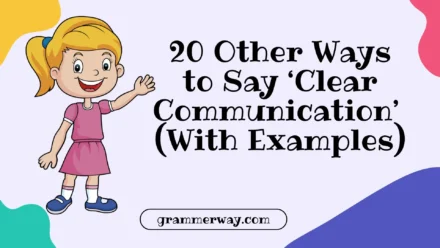
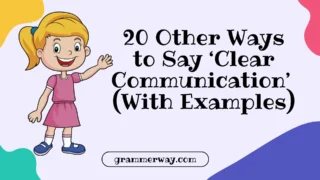
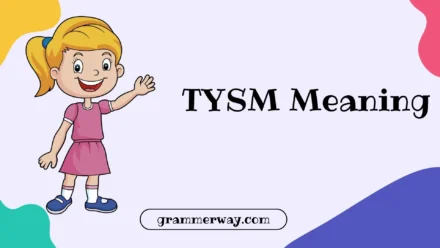
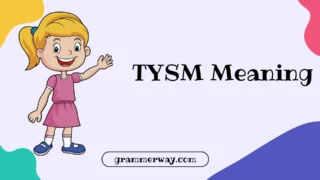
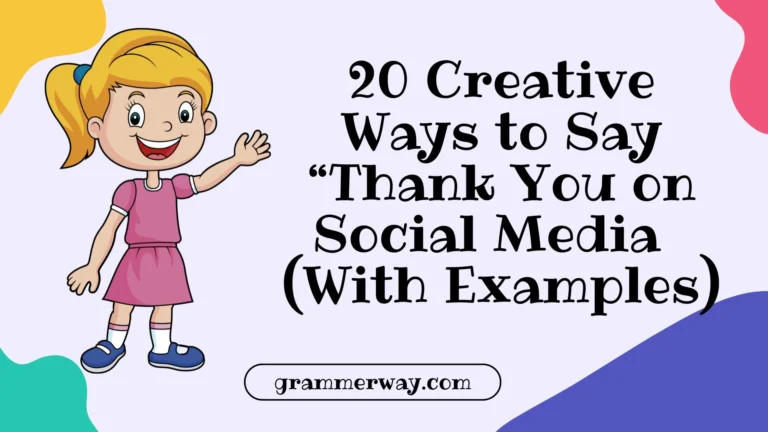
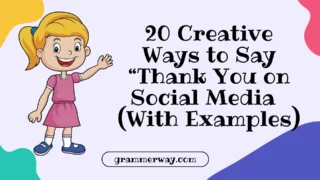
Leave a Comment